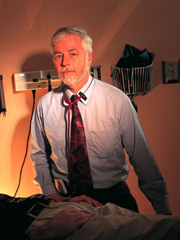John Wingard, M.D.
Professor of Medicine
College of Medicine
2005 Awardee
 As deputy director of the University of Florida Shands Cancer Center, medicine Professor John Wingard keeps extraordinarily busy finding ways to combat cancer with transplants. Wingard serves as director of UF’s Bone Marrow Transplant Program, with research focused on testing new ways to improve hematopoietic cell transplantation – the transplanting of blood stem cells, which is routinely used to treat patients with cancer and other blood and immune system disorders.
As deputy director of the University of Florida Shands Cancer Center, medicine Professor John Wingard keeps extraordinarily busy finding ways to combat cancer with transplants. Wingard serves as director of UF’s Bone Marrow Transplant Program, with research focused on testing new ways to improve hematopoietic cell transplantation – the transplanting of blood stem cells, which is routinely used to treat patients with cancer and other blood and immune system disorders. During the past nine years, we have tripled the number of transplants performed, all in the context of a strong clinical research emphasis,” Wingard says. Using tissue from patients who have been transplanted at UF, Wingard and his team have demonstrated that donor hematopoietic cells transplanted into patients can change into other types of tissues. This has obvious potential for good, which, if harnessed, can repair injured or diseased tissues. Most polyps are benign, but over time, they can turn into cancer.
The remarkable thing about our observation is that healthy cells given to the transplant recipient became involved in a transformation into a pre-cancerous condition already present in the patient,” Wingard says. “We hope to explore this phenomenon which may hold important clues as to how the early steps of cancer occur in the body.”
Wingard is also working with members of the UF stem cell biology team and other collaborators to evaluate the use of cord blood and other types of adult stem cells. Cord blood contain stem cells collected from discarded afterbirth (placenta and umbilical cord), and used for transplantation without harm to either the mother or infant.
“We have one of just 14 cord blood tissue banks in the United States here in Gainesville that participates in the National Marrow Donor Program, providing cord blood for patients in need of transplants here and around the world,” Wingard says.
“John is a leader whose research has led to new therapies for patients undergoing HCT, and to new transplant preparative regimens for patients undergoing HCT,” says Edward Block, distinguished professor of medicine and chair of the Department of Medicine.

